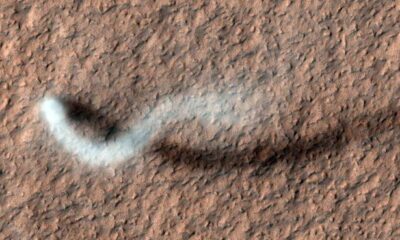Science
Scott Bolton Discusses Juno Mission and Discoveries on Jupiter

Scott Bolton, principal investigator of NASA’s Juno mission, recently shared insights into his work exploring Jupiter and the skills necessary for his role. Since its launch in July 2016, Juno has provided unprecedented images and data about the largest planet in our solar system, revealing fascinating phenomena such as hurricane-like spiral wind patterns near Jupiter’s north pole.
The Role of a Planetary Scientist
In his daily work, Bolton employs a diverse set of skills including mathematics, physics, geology, and atmospheric science. His responsibilities extend beyond scientific inquiry; he also manages the Juno team and communicates with various stakeholders, including politicians and NASA administrators. This requires Bolton to effectively discuss complex scientific topics with individuals who may not have a deep understanding of planetary science.
“I need a broad range of skills,” Bolton explained. “One of the most important is recognizing when I don’t have the right expertise and finding someone who can help.” This collaborative approach is vital for the success of the mission.
Passion for Discovery
Bolton expressed his enthusiasm for being part of a team that is continuously discovering new information about how the universe operates. “It’s exciting to be at the edge of something, where you are part of a team seeing an image or an aspect of how nature works for the first time,” he said. The thrill of discovery is a significant motivating factor for him and his colleagues.
He particularly enjoys witnessing the collaboration among scientists with varying expertise, skills, and backgrounds. “Watching that process unfold is very exciting to me,” Bolton added. This teamwork is critical as they work to unravel the mysteries of Jupiter.
Despite the excitement of discovery, Bolton mentioned some less enjoyable aspects of his job. He finds administrative tasks, such as budget exercises and documentation, to be time-consuming and often frustrating. “Some government rules and regulations can be quite taxing,” he noted. He aims to shield his team from these extraneous tasks to allow them to focus on their scientific work.
Lessons Learned
Reflecting on his career, Bolton shared valuable lessons he wishes he had known earlier. “If you really believe in something, you should stick to it,” he emphasized. Persistence and collaboration are essential for achieving goals, he believes. Early in his career, he did not fully grasp the importance of joining forces with others who could complement his skills.
Another key insight Bolton has gained is the value of taking time to thoughtfully approach challenges. “We should resist the temptation to rush into finding the answer,” he advised. By carefully considering questions and developing effective strategies, one can enhance the likelihood of success.
As the Juno mission continues to unveil the mysteries of Jupiter, Bolton’s insights highlight both the challenges and rewards of working at the forefront of planetary science. His commitment to discovery and teamwork exemplifies the spirit of scientific exploration.
-

 Entertainment3 months ago
Entertainment3 months agoAnn Ming Reflects on ITV’s ‘I Fought the Law’ Drama
-

 Entertainment4 months ago
Entertainment4 months agoKate Garraway Sells £2 Million Home Amid Financial Struggles
-

 Health3 months ago
Health3 months agoKatie Price Faces New Health Concerns After Cancer Symptoms Resurface
-

 Entertainment3 months ago
Entertainment3 months agoCoronation Street’s Carl Webster Faces Trouble with New Affairs
-

 Entertainment2 weeks ago
Entertainment2 weeks agoCoronation Street Fans React as Todd Faces Heartbreaking Choice
-

 Entertainment3 months ago
Entertainment3 months agoWhere is Tinder Swindler Simon Leviev? Latest Updates Revealed
-

 World2 weeks ago
World2 weeks agoBailey Announces Heartbreaking Split from Rebecca After Reunion
-

 Entertainment4 months ago
Entertainment4 months agoMarkiplier Addresses AI Controversy During Livestream Response
-

 Science1 month ago
Science1 month agoBrian Cox Addresses Claims of Alien Probe in 3I/ATLAS Discovery
-

 Health5 months ago
Health5 months agoCarol Vorderman Reflects on Health Scare and Family Support
-

 Entertainment4 months ago
Entertainment4 months agoKim Cattrall Posts Cryptic Message After HBO’s Sequel Cancellation
-

 Entertainment3 months ago
Entertainment3 months agoOlivia Attwood Opens Up About Fallout with Former Best Friend




















